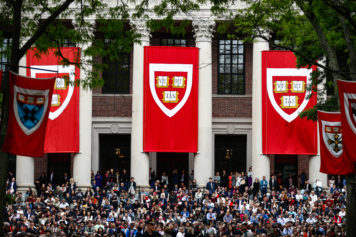Shocking details continue to emerge in an alleged multimillion-dollar admissions scheme in which wealthy white parents used their money, influence and familial ties to bribe their children’s way into the nation’s top colleges.
Hollywood actresses Felicity Huffman and Lori Loughlin were among the 50 people charged on Tuesday in what federal authorities called the “biggest college admissions scam” ever prosecuted, a group accused of shelling out nearly $25 million in bribes. Now fallout from the controversy has sparked renewed debate around affirmative action and the idea that it “takes spots away” from more deserving students.

This combination photo shows actress Lori Loughlin at the Women’s Cancer Research Fund’s An Unforgettable Evening event in Beverly Hills, Calif., on Feb. 27, 2018, (left) and actress Felicity Huffman at the 70th Primetime Emmy Awards in Los Angeles on Sept. 17, 2018. Loughlin and Huffman are among at least 40 people indicted in a sweeping college admissions bribery scandal. Both were charged with conspiracy to commit mail fraud and wire fraud in indictments unsealed Tuesday in federal court in Boston. (AP Photo)
“I want the people who were up in arms about affirmative action in college admittance to keep that same energy for rich people who pay to get their kids into Ivy League schools,” Twitter user @JenetAllDay wrote after the FBI announced charges against the defendants, which included top industry CEOs, college coaches and even SAT/ACT test administrators.
“These are the people who are ACTUALLY stealing your kid’s spot,” she added.
The National Conference on State Legislatures defines affirmative action policies as “those in which an institution or organization actively engage in efforts to improve opportunities for historically excluded groups in American society,” such as women and racial minorities. Conservative critics have long railed against the policy, however, calling it a “racist” quota system that gives minorities an unfair advantage over whites.
Tuesday’s bombshell college admissions scandal turned that argument on its head, while also highlighting the issue of “legacy admissions,” where students are given preference based on their familial ties to the alumni of an institution, and how wealthy whites can simply use their money and influence to buy their kids’ college acceptance.
“This admissions scandal is why students, especially Black and Latinx, who earn their place at Ivies with tears and sacrifice, should ignore people who say they are there because of ‘affirmative action,” said Twitter user @AnatheaButler. “The truth is, many of the students and parents saying this are the culprits.”
Activist Samuel Sinyangwe pointed out that “Harvard admits more white students with legacy preferences than the total number of Black students admitted each year. And that’s for being *related* to privilege, not even counting the kids whose parents just purchased their admission.”
Writer Andi Zeisler also weighed in on the issue, writing, “Perhaps it’s a good time to talk about all the perfectly legal ways the wealthy are both allowed and expected to manipulate the college-admissions systems while teaching their children to disparage ‘affirmative action.’ ”
The 2016 Fisher v. University of Texas at Austin Supreme Court case is the latest in a slew of line of court cases attacking affirmative action policies and whether they’re still needed. Would-be UT Austin student Abigail Fisher, who’s white, claimed she was being discriminated against and pointed to the university’s “race-conscious” admissions program as the reason she was rejected.
The Supreme Court ultimately ruled in favor of UT’s affirmative action program in June 2016. Before then, Justice Antonin Scalia suggested months earlier during oral arguments that Black and minority students were better off at a “less-advanced school, a slower-track school where they do well,” rather than at an elite school like UT where “they do not do well.”
Scalia died in February 2016, so he took no part in what became 4-3 decision (Justice Elena Kagan had recused herself from the case), but Clarence Thomas, the court’s sole Black justice, also sided with the conservative minority in the decision, writing in separate dissent, “The Constitution abhors classifications based on race because every time the government places citizens on racial registers and makes race relevant to the provision of burdens or benefits, it demeans us all.”
Justice Thomas’ position in the Fisher case stands in curious opposition to his outlook in 1983, when he ran the Equal Employment Opportunities Commission and called affirmative action policies “critical to minorities and women in this society,” and added, “But for them, God only knows where I would be today. These laws and their proper application are all that stand between the first 17 years of my life and the second 17 years.”
Education advocates blasted that assertion and argued that diversity on college campuses are necessary to not only fight bigoted racial stereotypes, but to encourage diverse points of view in the classroom and beyond.
Commentator Alexandra Erin offered a bleak view on the situation, however, arguing the admissions scandal would do little to change opposition to affirmative action because “the idea that people get in ‘just for being Black’ or what have you is not based in reality and cannot be changed by evidence.”
She added: “If anything, this new information will be incorporated into the existing bigoted worldview – ‘so sad that even the children of millionaires have to resort to bribery to get in, if they’re white.”
Black scholar Michael Eric Dyson was equally outraged by the scandal, but a more pressing issue had his attention.
“Let me tell you what’s more corrupt,” he said in a video posted to Twitter. “The fact that you’ve got mostly African-American student athletes playing sports … to the tunes of multi-millions, adding collectively up to the billions, who get nothing but education while coaches on the sidelines reap millions through” advertisements and sneaker deals.”
According to federal authorities, athletics coaches involved in the alleged scheme were paid bribes to put students on lists of recruited athletes, regardless of their ability or experience, in an effort to boost their chances of admission. Parents shelled out between $200,000 to $6.5 million to guarantee their children’s acceptance, officials said.
So far no students have been charged, as they were likely unaware of the crimes. Meanwhile, Huffman and several other defendants are charged with conspiracy to commit fraud and could face up to 20 years behind bars.


